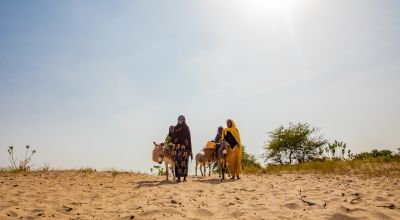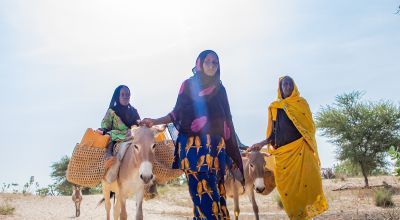
Read our 2023 annual report

Knowledge Hub
“Nowadays my husband is helping me with different tasks, and we are even falling in love more. We even miss each other when he spends some time away from home.”
These are the words of new mother Asmary Derebe, who took part in a programme which can help to prevent the unnecessary deaths of babies and their mothers, to deepen couples’ love and to support communities in some of the most vulnerable parts of the world. You may say it sounds too good to be true, but that is exactly what is happening in Ethiopia.
The Tigray and Amhara regions of Ethiopia are consistently vulnerable and prone to acute food insecurity due to multi-faceted crises, including conflict, protracted droughts, a lack of long-term development programmes and a shortage of functioning health facilities and staffing.
Ethiopia is particularly vulnerable to weather-related shocks, such as droughts and floods, with over 80% of the rural population dependent on rain-fed agriculture.
Ethiopia faces the added challenge of hosting 941,000 refugees from other countries, as well as recovering from intense conflict in the northern regions, with millions left internally displaced. At least 4.4 million people have been displaced and are living in temporary homes, according to The United Nations Office for the Coordination of Humanitarian Affairs.
Supporting mothers and babies

Concern Worldwide, with support from the European Union, is implementing a programme which aims to tackle the impact of conflict and drought through healthcare system strengthening and behavioural change, with a specific focus on addressing the underlying causes of malnutrition. Activities are implemented in six of the most vulnerable districts across the Amhara and Somali regions.
Asmaru (25) beams with pride as she plays with her baby daughter, Filagot. She attends the mother-to-mother groups twice a month and says they supported her and her family as she adjusted to motherhood.
She recalls: “I did not even know how to ensure my baby feeds on breastmilk, we used to feed her cow milk. I did not know that it is prohibited to give cow milk to a newborn baby. I did not even know how to ensure that I can produce enough breastmilk.
“The sessions taught me how to feed her properly, and after six months I learned how to make porridge that is full of different nutrients for the baby. When I gave birth, my baby was less than 2kg, at five months old she was 3kg. After I started feeding her breastmilk and looking after her in the proper way after receiving the training, now she is 11 months old and weighs 8kgs. She is more active, she is doing good...
“Another benefit is we got to know how to care for a pregnant woman. In earlier times, pregnant women would be working in hard labour, like lifting heavy items and fetching water but now we are sharing our knowledge on this issue. Also, we did not know that a pregnant woman needs to eat food of different varieties.”
Asmaru, who is based in Amhara, told how the programme may have even saved lives.
“In earlier times, people would give birth at home where bleeding would occur.
In the process of giving birth, the child could die and the mother as well.
"Now people know that it is important to get follow up from the health centre and that they may get other nutritional support from the health centre as well,” she explained.
"I now respect my wife"

Sisay Asmara Belay is a 38-year-old father from Mebluk village in the Amhara region. He works as a farmer and retailer, selling goods like coffee and soap.
He took part in a father-to-father group and says it has significantly impacted his family.
“I can say that there are two major changes in my life regarding my relationship with my wife and the relationship with our children.
“I expected my wife to do all the household chores by herself but after the training I understood that I should be helping her in some activities. I never used to give my wife a lot of respect but now I respect her a lot."
He continued to say: “In our community in the past, there was this thing where women were not allowed to attend community meetings. People would ask, 'who is she to come here and comment?' but now things have changed, and women are allowed to participate in meetings and to share their thoughts.”

Asmaru echoes this sentiment, as she speaks about the difference the workshops have made to her relationship with her husband, Derise Demise.
“Now we even have discussions around family planning, and I am not afraid that I will get pregnant randomly. I am comfortable that we will have a discussion together before getting another child.”
Looking into the future, Sisay is eager to continue spreading the knowledge he gained to help others improve their relationships, promote gender equality, and enhance overall well-being within his community.
He says: “My wish for the future can be categorised in two ways as follows. One is for my family. I wish for good health for my children. I also wish to maintain my wife’s health properly. My goal is to see my family healthy and happy.
“I hope my children become more active and good in education. That is how I see the future for my children. I know they will achieve and have a good learning ability.
“The other part is I don’t want to use all this knowledge to myself, but I want to transfer it to those who don’t know about it because it is important to spread these skills and knowledge to others.
"We take part in this father-to-father training every two weeks and we know how to take care of our children, how to take care of our wives, and how to live in a proper way. So, my goal is to transfer these skills to others so that we can change the future together.”
In Partnership With
Other ways to help
Corporate support
Is your company interested in working together for a common cause?
Fundraise for Concern
From mountain trekking to marathon running, cake sales to table quizzes, there are lots of ways you can support our work.
Buy a gift
With an extensive range of alternative gifts, we have something to suit everybody.
Leave a gift in your will
Leave the world a better place with a life-changing legacy.
Volunteer with Concern
The lots of ways to get involved with our work as a volunteer
School fundraising
Without the generous support from schools, we wouldn't be able to do the work that we do.





